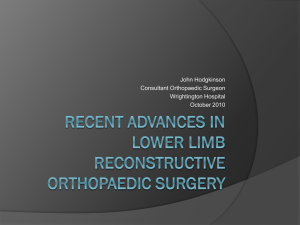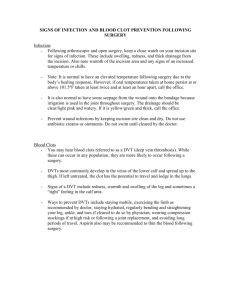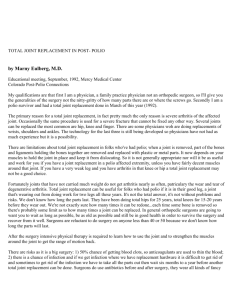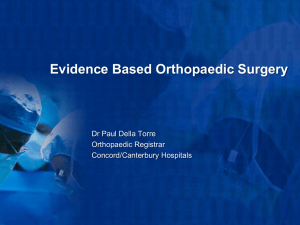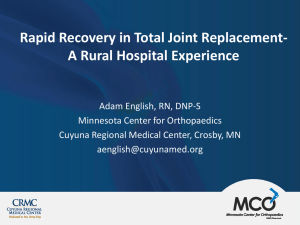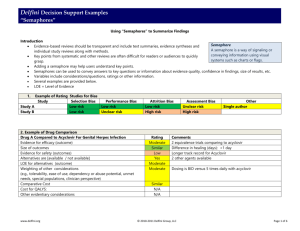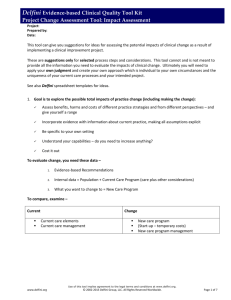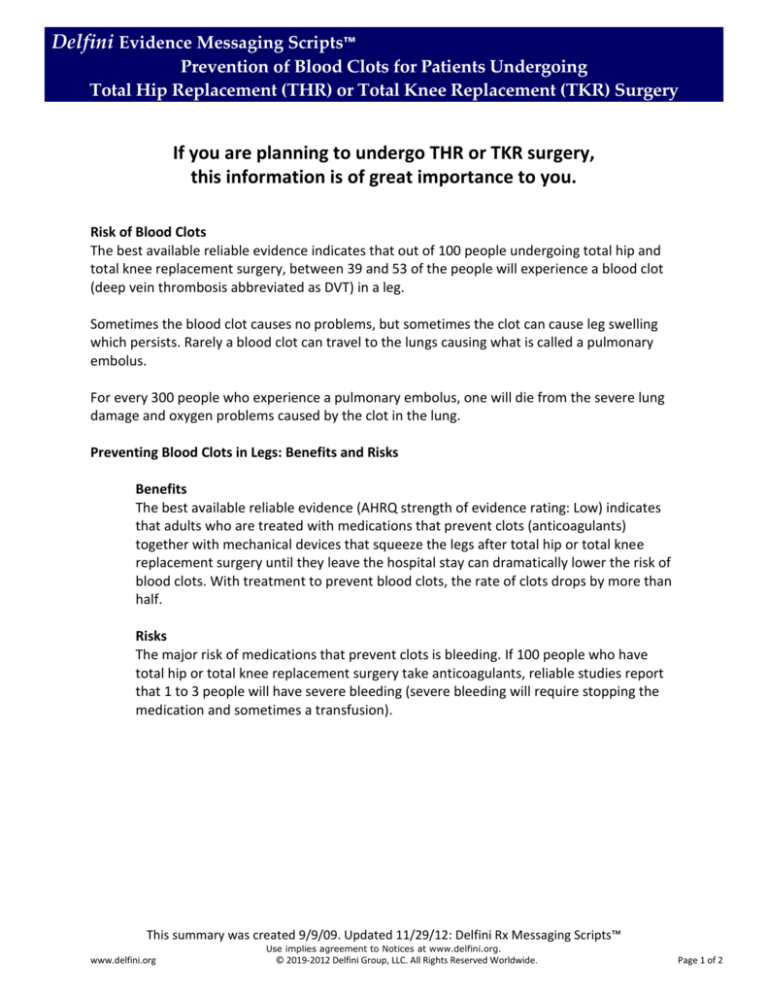
Delfini Evidence Messaging Scripts™
Prevention of Blood Clots for Patients Undergoing
Total Hip Replacement (THR) or Total Knee Replacement (TKR) Surgery
If you are planning to undergo THR or TKR surgery,
this information is of great importance to you.
Risk of Blood Clots
The best available reliable evidence indicates that out of 100 people undergoing total hip and
total knee replacement surgery, between 39 and 53 of the people will experience a blood clot
(deep vein thrombosis abbreviated as DVT) in a leg.
Sometimes the blood clot causes no problems, but sometimes the clot can cause leg swelling
which persists. Rarely a blood clot can travel to the lungs causing what is called a pulmonary
embolus.
For every 300 people who experience a pulmonary embolus, one will die from the severe lung
damage and oxygen problems caused by the clot in the lung.
Preventing Blood Clots in Legs: Benefits and Risks
Benefits
The best available reliable evidence (AHRQ strength of evidence rating: Low) indicates
that adults who are treated with medications that prevent clots (anticoagulants)
together with mechanical devices that squeeze the legs after total hip or total knee
replacement surgery until they leave the hospital stay can dramatically lower the risk of
blood clots. With treatment to prevent blood clots, the rate of clots drops by more than
half.
Risks
The major risk of medications that prevent clots is bleeding. If 100 people who have
total hip or total knee replacement surgery take anticoagulants, reliable studies report
that 1 to 3 people will have severe bleeding (severe bleeding will require stopping the
medication and sometimes a transfusion).
This summary was created 9/9/09. Updated 11/29/12: Delfini Rx Messaging Scripts™
Use implies agreement to Notices at www.delfini.org.
www.delfini.org
© 2019-2012 Delfini Group, LLC. All Rights Reserved Worldwide.
Page 1 of 2
Delfini Evidence Messaging Scripts™
Prevention of Blood Clots for Patients Undergoing
Total Hip Replacement (THR) or Total Knee Replacement (TKR) Surgery
If 100 people undergoing total hip
replacement make the choices below:
1. No prevention
2. Anticoagulation alone
3. Anticoagulation with mechanical devices
If 100 people undergoing total knee
replacement make the choices below:
1. No prevention
2. Anticoagulation alone
3. Anticoagulation with mechanical devices
What is likely to happen:
About 39 out of the 100 people undergoing
total hip surgery will experience a blood clot in
a leg.
About 22 out of the 100 people undergoing
total hip replacement surgery will experience
a blood clot in a leg.*
About 11 out of the 100 people undergoing
total hip replacement surgery will experience
a blood clot in a leg.*
What is likely to happen:
About 53 out of the 100 people undergoing
total knee replacement surgery will
experience a blood clot in a leg.
About 30 out of the 100 people undergoing
total knee replacement surgery will
experience a blood clot in a leg.*
About 15 out of the 100 people undergoing
total knee replacement surgery will
experience a blood clot in a leg.*
*Calculations for blood clot (DVT) risk reduction are based on Agency for Healthcare Research and
Quality ( AHRQ) data. AHRQ may have included some relative risk data for hip fracture surgery in some
hip and knee DVT calculations.
Other Information
There are several medications used for preventing blood clots. Which drug is best for you
depends upon many factors such as other health problems you may have.
Your doctor will help you decide which drug is best for you.
Where did this information come from?
1. The information provided above came from a medical team that included orthopedic
surgeons, internal medicine specialists, pharmacists and other health professionals at Kaiser
Permanente Hawaii and Delfini Group who reviewed hundreds of studies in 2008 and 2009
and selected information from the most reliable studies.
2. Sobieraj DM et al. Venous Thromboembolism Prophylaxis in Orthopedic Surgery [Internet].
Rockville (MD): Agency for Healthcare Research and Quality (US); 2012 Mar. Available from
http://www.ncbi.nlm.nih.gov/books/NBK92319/PubMed PMID: 22536611.
This summary was created 9/9/09. Updated 11/29/12: Delfini Rx Messaging Scripts™
Use implies agreement to Notices at www.delfini.org.
www.delfini.org
© 2019-2012 Delfini Group, LLC. All Rights Reserved Worldwide.
Page 2 of 2

